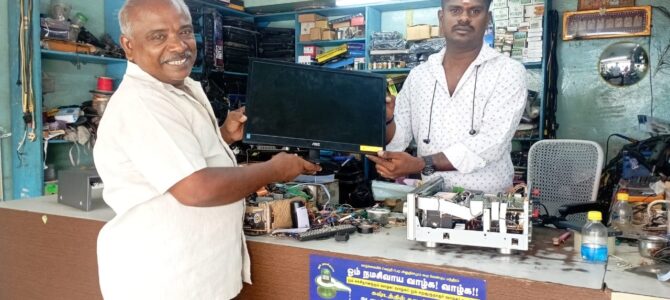Activities at FIN are guided broadly by a set of principles. In this series, we introduce them to you with examples. We encourage teachers to use our true tales in classes, as stories always help students remember concepts!
#Circular Economy Consumption
How do we consume today? We buy and buy (even things we don’t really need) and when a product no longer works, or we want a new or ungraded version of it – we throw it away and it joins the mountains of waste generated in the city or town or village. Sometimes, the product is recycled or reused, but more often than not, it enters a landfill, a dump, or a water body, increasing pollution, climate warming and consequentially ill health. Now, consumption under the circular economy, means finding ways to keep products in use for as long as possible. And when that becomes impossible, to finding ways to dispose of them, so that they cause least harm to the natural environment. Let me illustrate.
Paranjothi sir is the Field Manager of the FIN Rural Lab. He is a circular economy consumption champion, not only because he believes this is the best way for society, but also because he is very careful not to waste any funds of our very limited budget. He is in charge of our maintenance and purchasing.
In Kameswaram village, FIN runs a computer skilling class, using second-hand computers, which are the only ones we can afford. Recently one of the computer screens started giving problems. Paranjothi sir visited many fancy computers shops, and they told him, “Sir, please buy a new screen – we have many models – there is no point in trying to repair this old screen – it won’t be possible.” Paranjothi sir was very troubled.
Now, on one of the roads of Nagapattinam town, there is a TV repairs shop and Paranjothi sir had always been very impressed by the diligence of one of the men working on all parts of TVs. So, on the spur of the moment, feeling very frustrated, he entered this shop and asked him, “Sir, I have a computer screen, I know it is not a TV screen. But, I am so impressed by all of you repairing TVs, I wish to request you to take a look at this screen.”
“Sure”, the man said with a smile, “but shouldn’t you be going to a computer shop? Why are you coming here?”
Paranjothi sir replied, “Sir, I have gone to many such shops and the men there said it was impossible to repair this screen. But, I come from an NGO and our madam is already working too hard to raise money to keep us running. I, as its field manager, am trying to keep all our gadgets in use for as long as possible, without buying ones.”
“That’s very good”, the TV repair man said, “OK, let me see what I can do”.
Now you can guess what happened!! A few days later, Paranjothi sir got a call: “Sir, you can come and pick up the computer screen, I’ve repaired it and it should work fine now!”.
Aren’t you impressed with the TV repair man? That’s his photo with Mr. Paranjothi! Such smart people who know how to repair things so that they can be used again are what we need for a circular economy!
Questions for class:
– Why don’t big companies make products for a very long time?
– Should big companies also support small repair shops so that their products are in use for the longest possible time?


